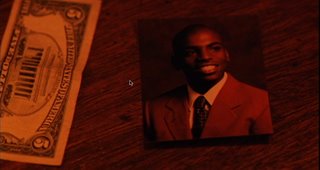Clockers Watching
Inside Man fans should take a second look (or a first look, like me) at Spike Lee's Clockers from 1995. Fans of the remarkable and underrated HBO series The Wire ought to do the same, and not simply because novelist Richard Price had his hand in both projects.
Like The Wire, Clockers tells a crime story from both possible perspectives: the cops' and the criminals'. The two forces are not presented as good and evil but as opposites more closely intertwined than either can see for itself. But besides its sober look at modern crime and punishment, Clockers is something that The Wire isn't: a compelling mystery.
 In a traditional crime story with a single perspective, mysteries are easy: we follow the cops as they try to catch the culprit, or we follow the criminal as they try to evade the police. The Wire is the ongoing struggle between the two forces and, in the interest of keeping the audience on an equal plane with both sides, nothing is kept from the viewer.
In a traditional crime story with a single perspective, mysteries are easy: we follow the cops as they try to catch the culprit, or we follow the criminal as they try to evade the police. The Wire is the ongoing struggle between the two forces and, in the interest of keeping the audience on an equal plane with both sides, nothing is kept from the viewer. (Interestingly, the only other American film I know that balances this structure so deftly also structures its crime story around contemporary racial issues, and that's Barry Shear's Across 110th St, which could very well serve as a template for Clockers and The Wire)
Clockers shows us the criminals, but not the crime. A low level drug dealer with a bad stomach named Strike (Mekhi Phifer) is told by his boss (Delroy Lindo) that elimininating a particular individual could improve his pay grade. Strike goes to his brother Victor (Isaiah Washington), and asks for his help in the murder. Strike confronts the guy he needs to kill and Lee cuts to two detectives: Rocco Klein (Harvey Keitel) and Larry Mazilla (John Turturro). They find the body but the question remains: who exactly killed him? Victor claims he did it, but Klein doesn't buy the story. Is he lying to protect his brother?
Price contributes the film's structure and its deftness with the lingo of the precinct and the street. Lee directs a tremendous ensemble (Keitel, of course, but also Phifer, who captures all his character's contradictions and complexities with an intensity and authenticty I didn't expect from his work on ER or in 8 Mile) and burns half a dozen unforgettable images into your brain. Even the little moments are powerful: look at the simple beauty and clear underlying message of this establishing shot for a scene in which Klein asks some bar patrons if they know Strike.

In this next still, Klein is interrogating Victor and refuses to accept his account of the murder. "I want to see what you see," he says.

Clockers does what Inside Man does: it's a smart drama with messages, that doesn't sacrifice entertainment for preachiness. The critique of violent video games in Inside Man begins here, as does Lee's complex portrait of police work: a profession that invites heroism, pragmatism, and racism in equal doses. The director's cameo is of a ConEd worker who shows up at Klein's crime scenes and watches the proceedings like a spectator sport. He is fascinated, and Lee knows we are too.

0 Comments:
Post a Comment
<< Home